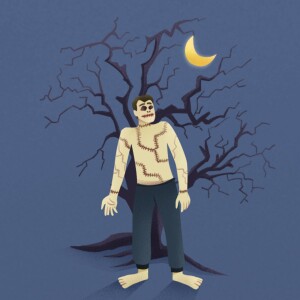
Friday Aug 18, 2023
Frankenstein: The Modern Prometheus
Chapter 1:What is the Frankenstein about
"Frankenstein" is a novel written by Mary Shelley and published in 1818. It tells the story of Victor Frankenstein, a young scientist who becomes obsessed with creating life. In his pursuit of knowledge and power, Victor successfully brings a creature to life using unconventional scientific methods. However, horrified by his own creation's monstrous appearance, Victor abandons it.
The creature, left alone and rejected by its creator and society, struggles to find acceptance and understanding. As it experiences rejection and cruelty from humans, the creature turns vengeful and seeks revenge on Victor, ultimately resulting in a tragic series of events that challenges the boundaries between science, morality, and the consequences of playing god.
The novel explores themes of scientific ambition, the human desire for power and knowledge, the responsibility of creators towards their creations, alienation, and the complexities of humanity. It raises profound questions about identity, ethics, and the moral implications of tampering with nature.
Through the contrasting perspectives of Victor Frankenstein and his creation, Mary Shelley offers a profound commentary on the human condition and the potential dangers of unchecked scientific advancements. "Frankenstein" has become a classic literary work that continues to captivate readers and spark discussions on the ethical implications of scientific progress and the nature of humanity itself.
Chapter 2:Frankenstein Ending
The ending of "Frankenstein" by Mary Shelley is poignant and tragic. After a series of devastating events, the novel concludes with Victor Frankenstein in pursuit of his creation, determined to bring an end to its existence. The chase leads them to the Arctic, where after a final confrontation, both Victor and the creature meet their respective fates.
In the end, Victor succumbs to exhaustion and dies aboard a ship in the frigid wilderness. Before his death, he expresses regret for his obsession with creating life and acknowledges the consequences of his actions. The creature, grieving the loss of its creator and overwhelmed by loneliness, appears at Victor's funeral pyre. It laments the pain and suffering it has experienced as a result of its isolation from society.
The creature's monologue at the end reflects its remorse and desire for redemption. It vows to end its own life, believing that there is no place for it in the world. The novel closes with the creature disappearing into the darkness of the Arctic, leaving the readers to contemplate the implications of Victor's ambitious quest and the repercussions of rejecting and mistreating the other.
Shelley's ending highlights the tragic consequences of Victor's ambition and the destructive cycle of rejection and vengeance. It raises questions about responsibility, empathy, and the consequences of neglecting one's creations. The conclusion leaves the readers with a sense of sorrow and reflection on the complexities of human nature and the moral dilemmas presented throughout the novel.
Chapter 3:Books like Frankenstein
-
"Dracula" by Bram Stoker: This classic novel tells the story of Count Dracula, a vampire who seeks to spread his curse in Victorian England. It delves into themes of evil, desire, and the struggle between good and evil.
-
"The Picture of Dorian Gray" by Oscar Wilde: This novel explores the consequences of vanity, immortality, and the pursuit of pleasure. It follows the life of Dorian Gray, whose portrait ages and reflects his sins while he remains eternally young.
-
"The Strange Case of Dr. Jekyll and Mr. Hyde" by Robert Louis Stevenson: This novella delves into the duality of human nature. It tells the story of Dr. Jekyll, who creates a potion that transforms him into the sinister Mr. Hyde, revealing the dark side of his personality.
-
"We Have Always Lived in the Castle" by Shirley Jackson: This haunting story follows two sisters, Constance and Merricat, living in isolation after a tragedy. It explores themes of guilt, family secrets, and the boundaries of societal norms.
-
"Wuthering Heights" by Emily Brontë: This gothic romance novel explores love, revenge, and the destructive power of obsession. The story revolves around the passionate relationship between Heathcliff and Catherine Earnshaw, set against the backdrop of the desolate moors.
-
"The Monk" by Matthew Lewis: This influential gothic novel focuses on the downfall of Ambrosio, a virtuous monk corrupted by lust and temptation. It contains elements of supernatural horror, religious critique, and moral corruption.
-
"Rebecca" by Daphne du Maurier: This atmospheric novel tells the story of a young woman who becomes the second wife of Maxim de Winter. As she settles into his grand estate, she unravels the secrets and mysteries surrounding his deceased first wife, Rebecca.
No comments yet. Be the first to say something!